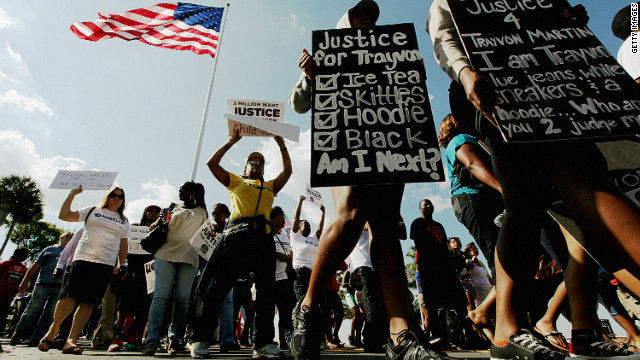Stand Your Ground: A Questionable Stance
Hordes of Floridians and other Americans came out to protest the judicial system’s handling of the shooting of teenager Trayvon Martin in 2012. The teen was killed by George Zimmerman.
In typical fashion, I spent my Saturday morning having coffee, sitting on the front porch and reading the news from my home city of Tampa. The stories all seemed pretty typical, uninteresting even, until I got to the “Crime” section. Several years ago, the story said, one man had shot his neighbor in a dispute in his front yard that began over a noise complaint. He immediately invoked Florida’s “Stand Your Ground” law. He promptly called a hotline that offered legal help for people who sought protection specifically under Stand Your Ground laws. He was never charged with any crime.
For most of my friends from New York, New Jersey or other Northeastern states, a quick explanation: Stand Your Ground laws say that in a threatening scenario, a citizen has no duty to retreat, and may defend his or her life with deadly force. In plain English, that means that if you feel your life is in danger, you are well within your rights to kill the person who is threatening you. It is important not to confuse this law with pleading self-defense in court – that right was never in question. Stand Your Ground laws grant the person in question immunity from even being prosecuted.
Florida was the first to pass such a law in 2005; it had the full support of the NRA, and the Unified Sportsmen of Florida, which is the local lobbying arm of the NRA. Other states that have Stand Your Ground laws also have these local affiliates.
Does anything about this law sound familiar? It should. It is part of the reason a Florida jury acquitted George Zimmerman of killing Trayvon Martin in 2013 (though Zimmerman never entered Stand Your Ground as part of his defense). Nor was it the only case that attracted attention because the Stand Your Ground laws were a factor. In some instances, would-be defendants in court are granted immunity from prosecution even if they initiated the confrontation by seeking someone out or pursued the victim after the confrontation began. Drug dealers have even used these laws as a defense to receive immunity from prosecution. The law has produced a great deal of inconsistency in how it is applied and what outcomes it produces for the accused.
So why does any of this matter? The biggest problem is that these laws are distorting the criminal justice process. Instead of each side putting forth their arguments for innocence or guilt for a jury to decide, we resort to poorly-worded and vague laws that allow criminals to practically get away scot-free. These laws are so unpopular among prosecutors that the American Bar Association, after a thorough investigation, advocated for the repeal of any Stand Your Ground laws that currently exist, as well as a moratorium on new Stand Your Ground laws.
There is no proof that these laws actually do anything positive for the community. At best they provide immunity for people who would have gone unprosecuted or been acquitted using the normal self-defense rights. At worst, they are keeping the criminal justice system from doing its job properly. The details vary in each case, but there frequently seems to be someone involved who is always well-read on their right to carry a weapon, but lacks the common sense to know when to exit a dangerous situation — the kind unafraid to leave and return with a gun who suddenly become fearful for their lives when things come to a head.
Nobody’s rights are being expanded by this law, and while it is hard to tell because of the sheer amounts of legal ambiguity, there may be reason to think that more people have been hurt by this law than helped. It is time to stop expanding Stand Your Ground laws, and, if possible, have state legislatures roll them back.









